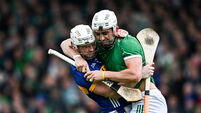Mike Quirke: It’s time to speak up for the good of the game

You can play with your club, college, or county and for the duration of that game, and within the rules, you can hit everything that moves around you. It doesn’t matter if you went to school with the guy, or you’re his buddy through work — if he’s playing against you, you do what you have to do to win.
Once it was over, it was done. Shake hands. Whatever happened is left between the white lines. It’s always been the GAA way.












